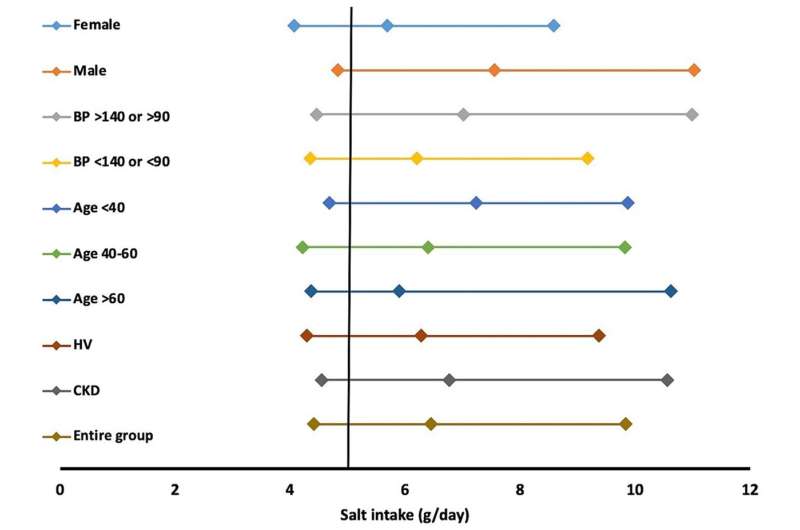This article has been reviewed according to Science X's editorial process and policies. Editors have highlighted the following attributes while ensuring the content's credibility:
fact-checked
trusted source
proofread
Study reveals disturbing dietary trends in North India

Researchers at The George Institute for Global Health India, in collaboration with the Postgraduate Institute of Medical Education and Research (PGIMER) in Chandigarh, have conducted a comprehensive study on the dietary habits of North Indian populations, focusing on the intake of sodium, potassium, phosphorus, and protein, that have an impact on the risk of development of non-communicable diseases such as hypertension, cardiovascular disease, and chronic kidney disease—fast-growing health challenges in the country.
The study, published in the journal Frontiers in Nutrition, involved more than 400 adult participants encompassing healthy adults and those with early-stage chronic kidney disease (CKD). It utilized 24-hour urinary excretion analysis to assess nutrient intake.
This method is considered more accurate than dietary recall because it is less prone to errors related to memory or estimation of portion sizes. Care was taken to ensure the urine samples' reliability for analysis.
Meticulous analysis revealed some alarming trends: excessive salt consumption surpassing recommended levels, inadequate potassium intake (both of which increase the risk of development of hypertension, cardiovascular disease, and chronic kidney disease), and protein consumption below the recommended dietary allowance. Men exhibited higher nutrient intake compared to women.
"A poor nutritious diet is a major risk element for non-communicable diseases (NCD), which are of considerable public health concern. In India, people eat different foods, so it is important to know exactly what nutrients they are getting to help prevent and manage these diseases. The high salt intake and low potassium intake point to the need to develop interventions targeted to individuals and societies," said Prof. Vivekanand Jha, Executive Director, The George Institute for Global Health, India and a kidney health specialist and the lead study author.
These findings highlight the fact that while the dietary intake of several nutrients is necessary for good cardiovascular and kidney health, their consumption is suboptimal. It also highlighted the need for personalized changes in diet to reduce the risks of common non-communicable diseases (NCDs). The study also emphasizes the importance of accurate dietary assessments to provide personalized advice and develop effective policies.
Emphasizing the urgency for public awareness campaigns, individual counseling, and food policy reforms, Prof. Vivekanand Jha, Executive Director, The George Institute for Global Health, India, added, "The study shows that it is important to have dietary guidelines that are specific to local area. We need to take action to fix imbalances in nutrients and encourage people to eat more healthily by increasing diversity."
To lower the risks of non-communicable diseases (NCDs), researchers suggested using multifaceted strategies, including providing better information on food labels so people can make healthier choices, reducing salt in processed foods, and encouraging people to eat more fruits and vegetables rich in potassium. This study shows how to take proactive steps to fight NCDs, fostering a healthier future for North Indian communities.
More information: Prabhjot Kaur et al, Estimation of dietary intake of sodium, potassium, phosphorus and protein in healthy Indian population and patients with chronic kidney disease, Frontiers in Nutrition (2024). DOI: 10.3389/fnut.2024.1312581





















